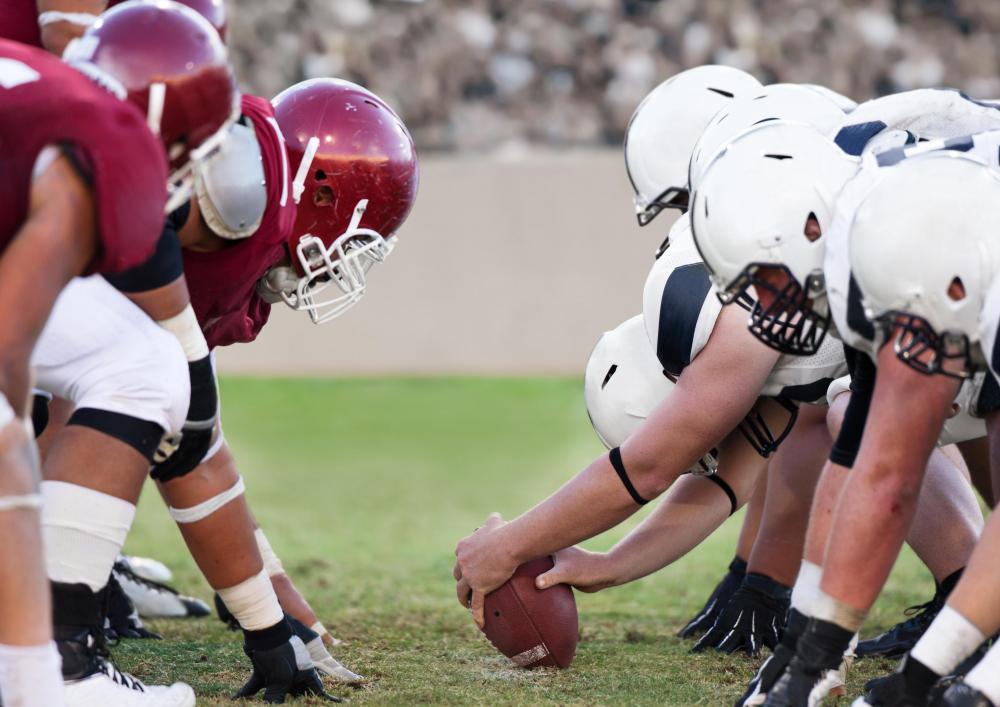At WiseGEEK, we're committed to delivering accurate, trustworthy information. Our expert-authored content is rigorously fact-checked and sourced from credible authorities. Discover how we uphold the highest standards in providing you with reliable knowledge.
How do I Improve my Fitness for Football?
Football is an extremely physically demanding sport and physical fitness is an integral aspect of performing well. Different positions on the field demand different types of physical fitness however, so the type of fitness that each player might have to focus on differs from position to position. If one wants to improve their fitness for football, then one must first decide the position at which they will train.
Athletes who are aspiring to improve their fitness for football, specifically linemen positions, need to focus on training which emphasizes explosive speed and overall strength training. Offensive and defensive linemen can focus on running exercises, which feature short sprints that explode out of a crouching position, since that is the type of running they will do on the field. Distances for short sprints can differ, depending on the stage of fitness a lineman is in, but distances between 10 and 50 yards (9.1 and 45.7 m) are adequate.

It is important to come firing out of a crouch when doing this sprint because that simulates the actual play on the football field. A lineman looking to improve his fitness for football might also want to focus on heavy upper body weight lifting, with a special emphasis on bench presses, because arm and hand strength generated from a pushing motion is very important to the position. Lower body weight lifting, such as leg presses and squats are also important for a lineman looking to improve his fitness for football, because when a lineman blocks, much power is generated from the legs.

Running backs, cornerbacks, and receivers all train in a similar fashion, with slight variability in exercises, depending on the individual player’s body type and style of play. Someone trying to improve his fitness for football at these positions would want to have a workout regimen that is full of distance running and cardiovascular exercises. Sheer strength is not as important at these positions as it is for linemen.

Running backs, defensive backs, and receivers depend much on speed, quickness, and coordination. While weights would help the fitness of players at these positions out as well, because after all, all football players need strength, pleometric exercises as well as rope jumping are a good way to enhance fast twitch muscle movement, which is relied upon so heavily at these positions to generate speed.

Quarterbacks and linebackers who are looking to improve their fitness for football are in a little bit of a different position than backs and lineman, since there is so much variability in the styles that their positions are played. For example, there are quarterbacks who rely heavily on mobility. These quarterbacks might improve their fitness through pleometrics or tire training, while other quarterbacks who rely more heavily on their stability might just work on their endurance by jogging and focus on upper body workouts to strengthen their arms.
Linebackers also tend to either shift in their approach to training depending on whether they are primarily a pass or run defending linebacker. In essence, all football players depend on a fitness regimen that improves strength, explosiveness, and coordination, though the level of these attributes in relation to each other shifts from position to position.
AS FEATURED ON:
AS FEATURED ON:














Discussion Comments
Have you ever noticed that the movements of some body builders and some football players appear stiff, and their bodies don't appear to be particularly flexible? This can happen when you continually focus on lifting heavy weights and build body mass.
While concentrating on getting stronger, players should also perform exercises that increase explosiveness. This can be done with lighter weights, or even better with specific exercises such as jumping and throwing drills designed for football.
Aside from weight lifting to improve strength, drills that improve footwork are probably the most important for football players as a whole. Regardless of which position a player occupies, he can benefit from better footwork.
Ladder drills are a good way to improve coordination and agility for football. These drills involve players running, hopping, jumping and stepping through the openings between the rungs of ladders lying on the ground. Rope ladders or some device akin to the rope ladder are commonly used for this purpose. Tires can also be used.
For football players who are either defensive or offensive linemen, wrestling is a good way to build the muscles that will come into use on the football field. By wrestling, I mean the Olympic/amateur type--not professional wrestling.
Wrestling also helps football players develop flexibility and improve their agility, and develop techniques for football blocking and techniques for escaping and shedding blocks.
Post your comments